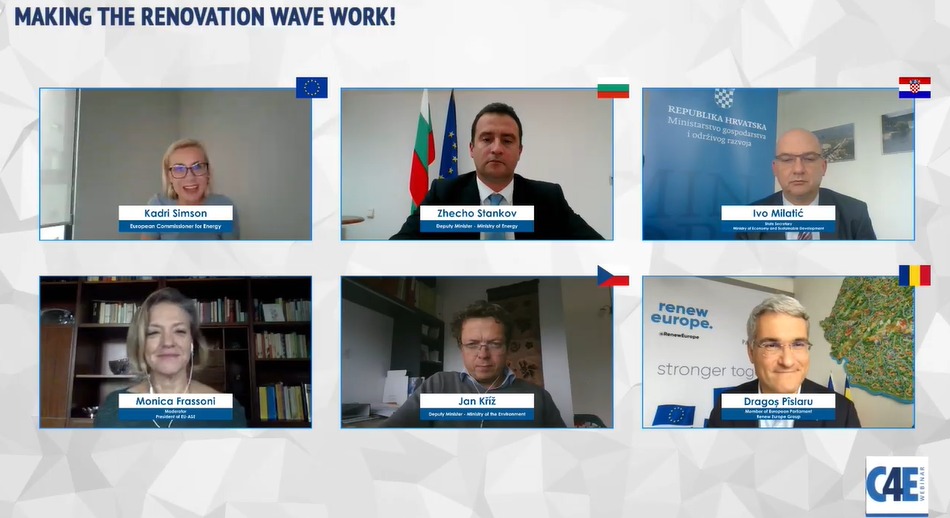BPIE: On the way to a climate-neutral Europe – Contributions from the building sector



by Kamila Waciega, Public Affairs Director for Energy at Veolia, and Ville Niinistö, Finnish Member of the European Parliament and coordinator for the Greens/EFA group in the Committee on Industry, Research and Energy.
In its recent communication on the European Union climate target for 2030, the EU Commission described energy efficiency legislation and policies as essential instruments contributing to the achievement of the new 2030 greenhouse gas reduction.
However, according to the accompanying impact assessment and the evaluation of National Energy and Climate Plans, the EU will surpass its current target for renewable energy by 1.7%, while it will still fail to meet its current 2030 efficiency target by 3%.
A similar result is expected for the energy efficiency target for 2020.
As the Commission is in the process of revising the Energy Efficiency Directive (EED), it is crucial to seize this opportunity to address the reasons for such an outcome of current energy efficiency policies.
One clear issue is the fact that the renewable energy target is binding at EU level, while the energy efficiency one still is not.
In the current context of dire health, economic and environmental crisis, we cannot afford this discrepancy. We need both higher and nationally binding energy efficiency targets, given all the benefits that investments in this segment can reap.
Following the position of the European Parliament, which asked for 60% emissions reduction by 2030, and taking into account the abovementioned impact assessment, the existing target for energy efficiency needs to be increased to 45% to untap the energy efficiency potential.
To ensure delivery, the EU level target should be made binding.
However, setting a better target is not enough. The most arduous element is providing means to achieve it. Those are regulatory and financial, and both can be ensured through the EED, which is currently planned for revision by June 2021.

On 21 October EU-ASE president Monica Frassoni participated in a high level online debate on the Renovation Wave and the role of EU regions in its implementation in the framework of the 18th European Week of Regions and Cities.
In her intervention, president Frassoni discussed the need to focus on the quality of renovation interventions, access to finance and public buildings to make the Renovation Wave a success.
Speakers included EU Commissioner for Energy Kadri Simson, Commissioner for Cohesion and Reforms Elisa Ferreira, and MEP Ciaran Cuffe.

On 16 October EU-ASE president Monica Frassoni moderated the panel discussion of the C4E Webinar on “Making the the Renovation Wave work!”.
Speakers included EU Commissioner for Energy Kadri Simson, official representatives responsible for energy from Croatia, Bulgaria, Czech Republic and a member of the European Parliament from Romania.

The European Commission unveiled today its much-anticipated Renovation Wave initiative. The strategy outlines the steps needed to renovate more than 220 million existing buildings by 2050.
It also calls for the EU to at least double the current annual rate of buildings energy efficiency renovation by 2030 and to foster deep energy renovations. This would equal to renovating up to 35 million buildings over the next 10 years.
The European Alliance to Save Energy (EU-ASE) welcomes the initiative, which comes at a crucial moment for Europe’s short-term economic recovery and long-term path towards climate neutrality.
The Renovation Wave rightly underlines the importance of energy efficiency first principle as a horizontal guiding principle of European climate and energy governance and beyond, to make sure we only produce the energy we really need. The Commission announced the publication of the guidance on the energy efficiency first principle in early 2021.
A key element of the initiative is the proposal of a phased introduction of mandatory minimum energy performance standards for existing buildings, as part of next year’s revision of the Energy Performance of Buildings Directive (EPBD).
EU-ASE highly welcomes the accompanying document on EU funding of the Renovation Wave and the commitment by the Commission to ensuring that buildings are included as a top priority when assessing national recovery and resilience plans.
Monica Frassoni, President of the European Alliance to Save Energy said:
“We welcome the Renovation Wave as a key strategy to increase the energy efficiency of buildings by reducing their energy consumption and by fostering the greater quality, rate, and depth of comprehensive renovations. If this strategy is rightly implemented, the benefits will be tremendous. These will include improved comfort, cleaner indoor and outdoor air quality, reduced energy bills, local qualified jobs, and millions of citizens lifted out of energy poverty”.
Harry Verhaar, Chair of the board of the European Alliance to Save Energy and Head of global public & government affairs at Signify said:
“We welcome the Renovation Wave as the best kick-start of economic recovery in Europe. In particular, the decision to extend Article 5 of the Energy Efficiency Directive to all public buildings, including private schools and hospitals, is excellent news. Increasing the renovation rate of our buildings is the biggest job machine at our disposal, and these are good local jobs that replace expensive energy imports. Now let’s use the Renovation Wave as a lighthouse on our way to climate neutrality”.
Bonnie Brook, Vice-Chair of the board of the European Alliance to Save Energy and Senior Manager Industry Affairs – Building Automation at Siemens Switzerland said:
“A Renovation Wave is essential as for the EU it will be impossible to become carbon neutral without massively renovating its old and inefficient building stock. Renovation, decarbonisation, and digitalisation should go hand in hand to achieve Europe’s ambitious climate targets. For these reasons, we welcome this initiative, hoping that it will be followed by the
necessary legislation to make sure that smart infrastructure and innovative business models will enable and accelerate the energy transition for all Europeans.”
Bertrand Deprez, Vice-Chair of the board of the European Alliance to Save Energy and Vice-President EU government affairs at Schneider Electric said:
“Making our buildings energy efficient is key to reconcile Europe’s climate objectives with rapid economic recovery across Europe. The added value of this initiative is that it can be a strong driver for both. To ensure that the Renovation Wave objectives are met, the EU and its Member States need to scale-up the renovation rate by combining the principle of efficiency first with the deployment of distributed energy resources and the rise of digital technologies.”
With regards to the next steps, the Commission has outlined a list of related upcoming actions and their indicative timelines.
Contact
Matteo Guidi, Communication Officer
matteo.guidi@euase.eu
+32493372142
The European Alliance to Save Energy (EU-ASE), established in 2010 by some of Europe’s leading multinational companies, creates a platform from which companies can ensure that the voice of energy efficiency is heard across the business and political community. EU-ASE members have operations across the 27 Member States of the European Union, employ over 340.000 people in Europe and have an aggregated annual turnover of €115 billion.